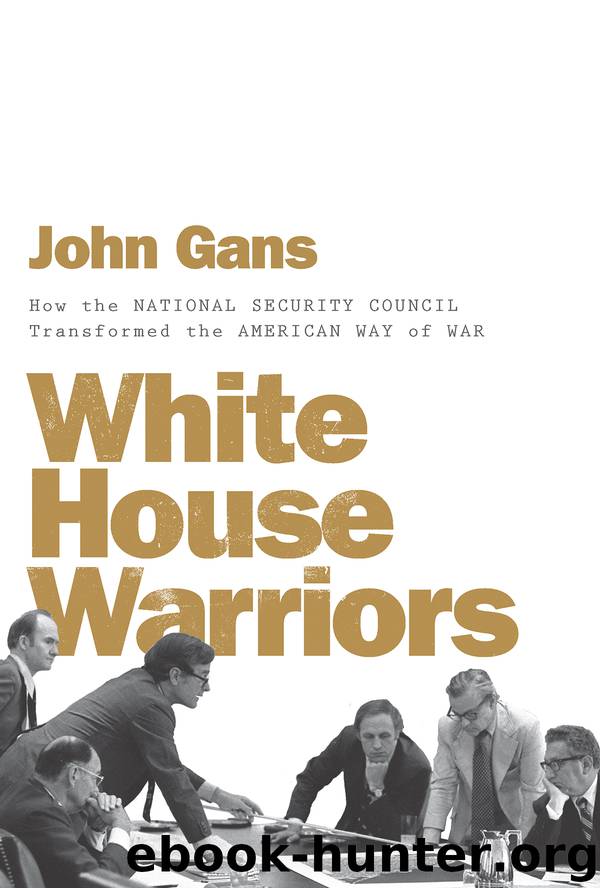White House Warriors by John Gans

Author:John Gans
Language: eng
Format: epub
Tags: Epub3
Publisher: Liveright
Published: 2019-03-07T00:00:00+00:00
“Meghan, Um, Where’s the President?”
Those hopes turned out to be, the US commander in Iraq later said, a “false high.”63 On February 22, 2006, the golden dome of the al-Askari Mosque in Samarra, one of the holiest sites in Shia Islam, was bombed. In the aftermath of the attack, as violence swelled, O’Sullivan and one of her directors, Brett McGurk, a Columbia-educated lawyer who had clerked on the Supreme Court and served as a civilian legal advisor at the US Embassy in Baghdad, explained in their nightly notes that some in Iraq were talking openly of civil war.64
At one point, Bush asked O’Sullivan, “How are your friends in Iraq?” The NSC staffer replied, “They’re scared, they’re terrified, they’ve never been more fearful, and they’ve never been more pessimistic.”65 The president’s public optimism—at one point he told Americans in a radio address, “Our strategy is getting results”—contrasted sharply with private thoughts of the military and his staff.66 In the face of the staggering violence, the US military pushed to take their hands off the bicycle seat and start withdrawing troops: one commander in the region said privately, “We need to get the fuck out.”67 Meanwhile, O’Sullivan was one of the “loudest internal critics” of the race to transition, according to an NSC colleague.68
In the early part of 2006, O’Sullivan traveled to Baghdad to help form the Iraqi government, a process that had stalled amid the violence, and later recalled that nearly every one of her meetings was “interrupted or punctuated by some security problem.”69 With everyone so scared, no one could focus on the conversations, let alone the compromises required to govern. Returning to the Executive Office Building and the Post-it note reminder on her computer about the insurgency, she became convinced the delay in political progress was not causing security to deteriorate, but fighting was trumping politicking as frightened Iraqis chose to settle their differences in the streets.
Those at the NSC were not the only ones trying to figure out what to do in Iraq. In fact, the war had become the subject of a robust round of introspection by the US foreign policy establishment. At think tanks and policy conferences, and in private conversations across Washington, those who had served in Iraq and just about everyone else appeared to have an opinion about what should be done in the war, and their advice spanned partisan affiliations and strategic persuasions. Congress had even established a ten-person “Iraq Study Group,” composed of former government officials, including a couple of former NSC staffers, to make recommendations on a path forward.
In the military, the Iraq War was an obsession, particularly among junior officers who had been serving in combat since the attacks of September 11, 2001. To try and understand the fight they faced, these service members were devouring the classics, like the writings of Prussian theorist Carl von Clausewitz, as well as the Middle East canon, including T. E. Lawrence’s Seven Pillars of Wisdom. Insurgency literature was in particular demand: dog-eared books and annotated articles were shared from the Pentagon’s E-ring to Baghdad’s Green Zone.
Download
This site does not store any files on its server. We only index and link to content provided by other sites. Please contact the content providers to delete copyright contents if any and email us, we'll remove relevant links or contents immediately.
| Arms Control | Diplomacy |
| Security | Trades & Tariffs |
| Treaties | African |
| Asian | Australian & Oceanian |
| Canadian | Caribbean & Latin American |
| European | Middle Eastern |
| Russian & Former Soviet Union |
The Secret History by Donna Tartt(18971)
The Social Justice Warrior Handbook by Lisa De Pasquale(12172)
Thirteen Reasons Why by Jay Asher(8856)
This Is How You Lose Her by Junot Diaz(6845)
Weapons of Math Destruction by Cathy O'Neil(6225)
Zero to One by Peter Thiel(5743)
Beartown by Fredrik Backman(5691)
The Myth of the Strong Leader by Archie Brown(5474)
The Fire Next Time by James Baldwin(5395)
How Democracies Die by Steven Levitsky & Daniel Ziblatt(5183)
Promise Me, Dad by Joe Biden(5120)
Stone's Rules by Roger Stone(5060)
A Higher Loyalty: Truth, Lies, and Leadership by James Comey(4920)
100 Deadly Skills by Clint Emerson(4888)
Rise and Kill First by Ronen Bergman(4747)
Secrecy World by Jake Bernstein(4710)
The David Icke Guide to the Global Conspiracy (and how to end it) by David Icke(4664)
The Farm by Tom Rob Smith(4475)
The Doomsday Machine by Daniel Ellsberg(4463)
